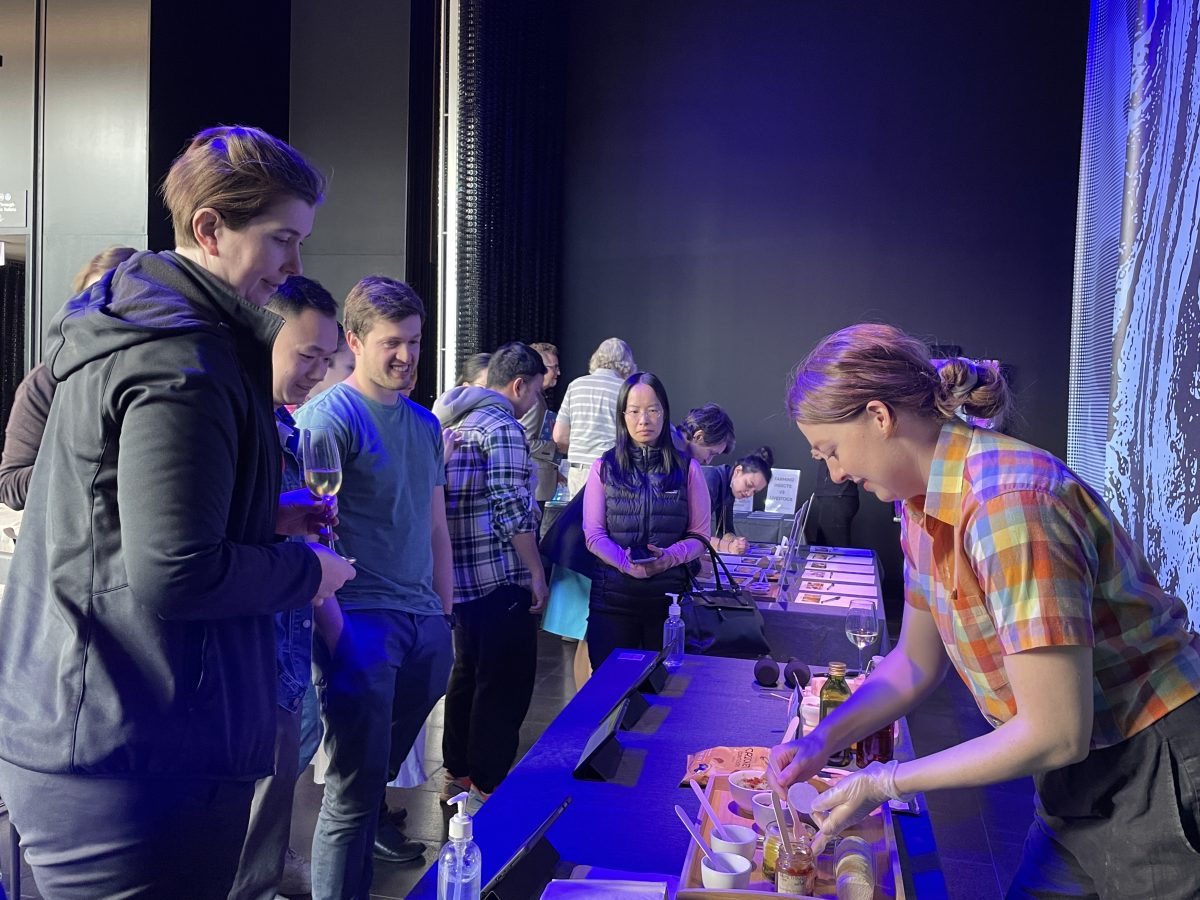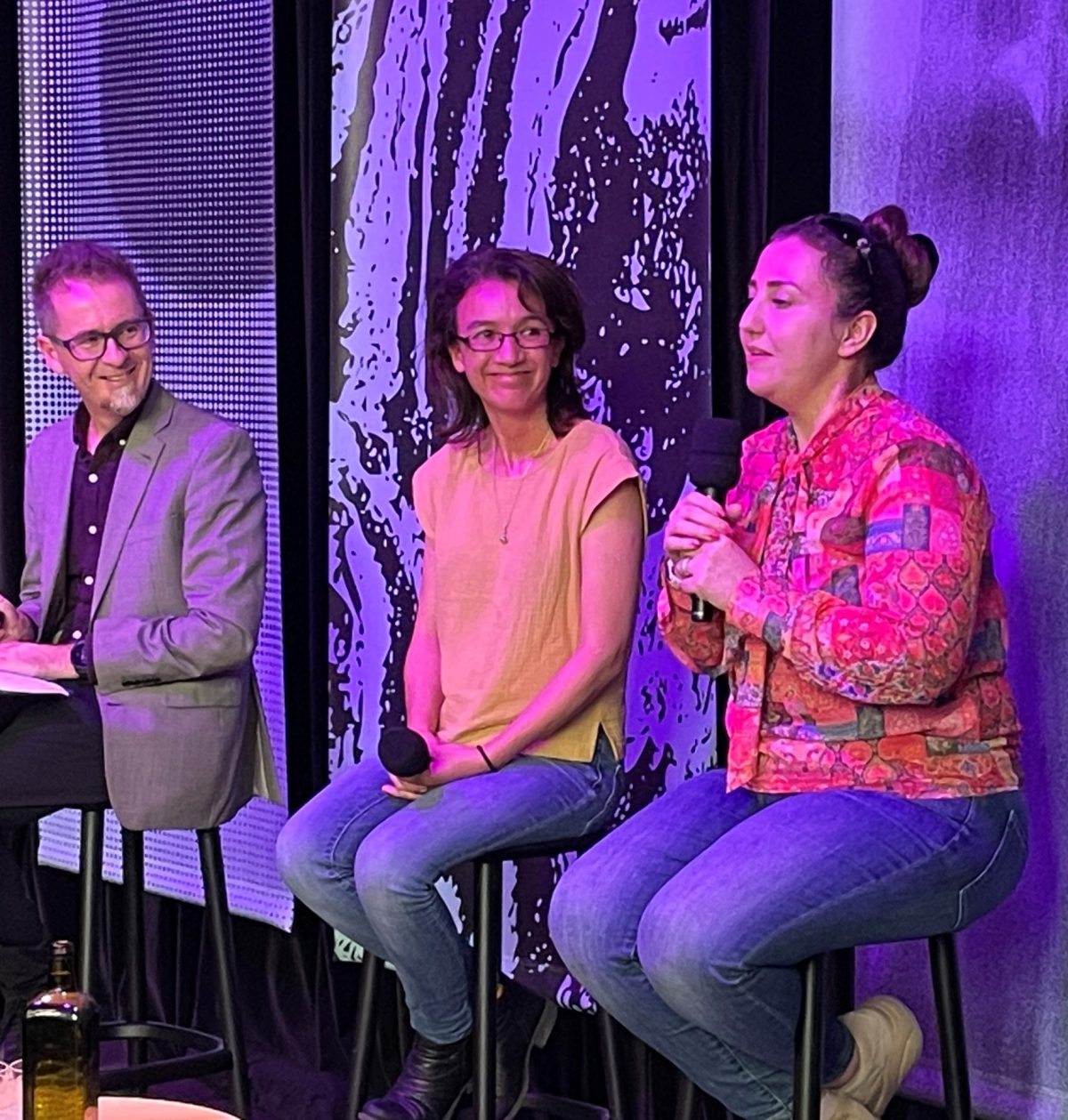Posted 3 Nov

Ethos: the ethics of insect-driven futures
MOD. hosted its fourth Ethos Community of Practice for 2022 in October. This endeavour looks at the ethics of technology and research – in this case the ethics of insect-driven futures. It aims to foster a culture of ethical questioning amongst researchers and the public.
This forum examined the ethics of our insect-driven futures by exploring questions around insects’ importance to human food sources, sustainability, design, and ecosystems. Guests began the evening eating insect canapés during an activity designed and facilitated by Stephanie Daughtry and Hannah Rohrlach from Post Dining. The activity also compared the environmental footprint of traditional protein sources (e.g. beef) with that of crickets and mealworms. Additionally, participants explored how they would incorporate insects into classic Australian recipes – such as green ant marmalade!
A discussion between Matthew Wright-Simon, Associate Professor Topa Petit, Jeannine Malcolm, and Dr Nasim Chitsaz then provided ethical provocations. Afterwards, we considered these ethical questions and insights into how we can sustainably use insects in food and design, whilst also preserving the ecosystems they support.

Post Dining’s activity highlighted CSIRO research showing the potential sustainability benefits of using insects as an alternative protein food source. For example, Hannah noted that it requires approximately 10,000 litres of water to raise 100 grams of beef, compared to just 43 litres to raise 100 grams of edible cricket. Additionally, there were sustainability benefits around smaller land and feed footprints and less animal product wastage.
So, why aren’t we eating more insects? Hannah noted current high costs and low availability are barriers that may be overcome as the industry ‘scales up’ in Australia. Additionally, one participant suggested that the initial revulsion many people have to the idea is a major barrier. Consequently, Jeannine noted that it is important to implement and market “insect-boosted products” as everyday supermarket foods – such as cricket powder pastas – rather than as a singular, novelty food. Hannah also referenced Adelaide research into how the food industry can incorporate insects into standard food products in ways that “make sense for the flavour profiles” of those foods.
Participants discussed how we can improve emerging technologies by basing design on certain insect characteristics. For example, Nasim is creating 3D prototype models of “bio-inspired wings”, based on different species of dragonfly. Nasim noted that different dragonflies have flexible, “corrugated wings” that allow them to hover in one spot, move very close to objects without touching them and fly long distances. We can attach these bio-inspired wings onto “micro vehicles” with sensors in the future, which could even be used to detect bushfire-threatening conditions and rapidly get close to disaster victims to allow doctors to identify their injuries.

Topa emphasised that we are in “the sixth mass extinction that the world has faced”. In fact, some studies show a “decline of up to 40% [of insect populations] a decade”. Topa noted that the main threats are land clearing and invasive species. For example, honeybees are a significant threat to Australia’s 2000 species of native bee. They outcompete local solitary bees for resources because they work in groups, can operate at low temperatures, and can travel long distances.
So, why are insects so important? Firstly, Topa said that insects are a vital part of the ecosystem and “are responsible for the base of the food chain”. For instance, tiny insects that can’t cross roads won’t provide a food source for larger insects, which in turn will negatively affect the food availability for larger vertebrates and so on up the food chain. Secondly, Topa noted that some insects are “fundamental to decompose organic matter”. For example, Jeannine works with Black Soldier Fly larvae, which “eat twice their body weight every day”. Consequently, they can significantly speed up the conversion of food waste to compost for soil health and plant growth.
One participant noted that current animal ethics and regulatory frameworks generally only apply to vertebrates, not insects. We discussed how there is likely to be an increased focus on ethics and regulations for insect research, farming, and conservation. However, Topa cautioned that that we tend to focus on “individual species conservation” when “ethics is about more than just looking at individuals, it’s about caring for entire ecosystems”. This approach to ethics seems important in the broader context to avoid overlooking ‘invisible’ forms of life when making decisions.
The Ethos Community of Practice is made possible with funding through the Deputy Vice-Chancellor of Research and Enterprise. The previous Ethos forum investigated the ethics of disposable health. We hold Ethos events regularly at MOD. Check out our events page for more details!
Samuel Wearne was the rapporteur for this forum and is a moderator at MOD.